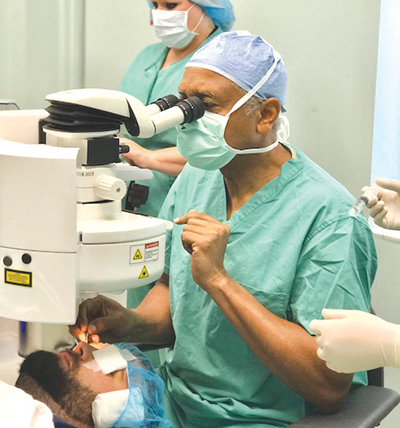Vision loss is among the conditions that can most negatively impact quality of life, and older adults are particularly vulnerable.
“As we get older, our risk for eye diseases and other conditions increase,” says Frank W. Bowden, III, M.D. FACS and founder of Jacksonville’s Bowden Eye & Associates. Some eye changes are normal and some can be more serious which require it to be caught early and monitored closely.
The good news: most cases of vision loss are avoidable and easily treatable. Here are five top eye health issues to watch for:

Trouble Reading Fine Print: Presbyopia, known as age-related farsightedness and common after age 40, happens when we lose the elasticity in the focusing lens of the eye. This can make up-close activities like reading, sewing or trolling your grandkids’ social media profiles, challenging.
Dry Eyes: Older adults tend to produce fewer tears. There are multiple potential culprits, including certain medications. But dry eye is particularly common among women who have gone through menopause.
If you’re going through menopause and dry eye is a side effect, it’s likely due to the decrease in the androgen hormone affecting the Meibomian and lacrimal glands. These glands produce our tears and the oil layer that protects our tears from evaporation. This is essential for the eye’s comfort and for focusing and clarity of one’s vision in general.
Spots or Floaters: The jelly-like substance that makes up the middle of the eye can thicken or shrink with age. When this happens, tiny clumps of gel can form and cause floaters in our vision.
Flashes and floaters can be disruptive to the vision or focusing and many times this is nothing more than just a frustration. However, if you’re experiencing a veil or cobweb-like effect, you should immediately reach out to your eye care provider for a same-day exam. This can be time sensitive and cause concerns of a retinal detachment. If this is ignored, it could lead to loss of vision.
Cataracts: Half of Americans over the age of 75 develop cataracts, clouding of the lens of the eye or of its surrounding transparent membrane that obstructs the passage of light and makes it difficult to see. Cataracts are treated with surgery.
If one lives long enough, they will develop cataracts. You can only have cataract surgery once. It’s important to make an informed decision about which type of cataract surgery is best.
Glaucoma: People of all ages can be diagnosed with glaucoma, but it’s most common among older adults and is one of the leading causes of blindness for people over the age of 60. The disease damages the optic nerve and symptoms develop so gradually that it often goes unnoticed until the late stages.
Glaucoma can run in the family but can also be caused by trauma such as being hit in the eye. Prescription eyedrops are helpful early on but treatment can progress to surgery.
Keeping on top of yearly, or sometimes more frequent eye exams depending on the eye condition, can ensure the best possible chance of a patient maintaining their lifestyle and independence.
Photo Credit: SHVETS production





